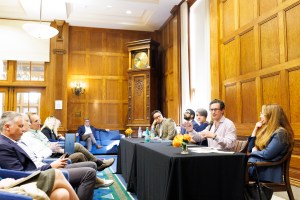New committee to create University-wide conflict of interest policies and principles
Subcommittee addressing unique HMS issues
A newly empaneled committee is about to begin an intensive review of University-wide conflict of interest (COI) “principles, policies and recommendations.”
The committee, under the direction of David Korn, vice provost for research, is charged with examining “existing policies and practices governing individual and institutional relationships with industry, and formulat[ing] new principles and guidance for Harvard University, its Schools, and its community, including faculty, staff, and students.”
The 16-member committee — which includes two ex-officio members — is drawn from nine of the University’s Schools, including three from Harvard Medical School (HMS) and three from the Faculty of Arts and Sciences (FAS).
A subcommittee of the University-wide body has already begun a review of HMS COI policies and practices and the entire committee will “review the recommendations of the Medical School subcommittee to ensure consistency with University-wide principles, policies, and recommendations.” The HMS review is the latest in a series of regular reconsiderations of how the School handles COI issues.
The committees are conducting their reviews at a time when some leading members of Congress have called for more transparency in the financial arrangements some academic researchers, especially physicians engaged in clinical research, have with industry.
The role of the new Harvard committee “is to create a set of overarching policies and principles for the entire University,” said Korn, a former dean of Stanford University School of Medicine who, as a senior vice president of the Association of American Medical Colleges, earned a national reputation as a leader on conflict of interest issues. “We’ll be working closely with the Medical School to make sure that their policies are in line with those of the University, recognizing that they have a unique set of issues to deal with.”
After pointing out that relationships with industry “serve vital roles,” including “facilitat[ing] the translation of knowledge to practical uses that can have a direct and beneficial impact on society,” the charge to the committee states that those relationships “require appropriate policy guidance and monitoring to ensure that they remain principled and transparent, and that Harvard is upholding fundamental values of academic independence and research integrity.
“Universities serve a vital role in our society as independent arbiters of knowledge,” the charge continues, “and they occupy a privileged position that is rooted in the public’s continued confidence in their integrity, credibility, and trustworthiness. Therefore, especially important is the institution’s obligation to make certain, both in fact and in appearance, that activities occurring at Harvard are free from improper influence.”
“The committee has an extremely important, complicated task ahead of it,” said University Provost Steven E. Hyman. “It has to create policies that will be workable for Schools with very different missions, such as the Graduate School of Design and the School of Public Health. In working with its HMS subcommittee, the University committee needs to acknowledge that our affiliated hospitals — all of whose faculty have Harvard appointments — are fully independent institutions with their own COI issues and policies. Notwithstanding, it is our goal to achieve the maximum possible harmonization of conflict of interest policies and practices across these related institutions in which Harvard faculty pursue their academic work. ”
Just a few of the many thorny issues the University-wide committee is charged with addressing are:
• Consulting arrangements;
• Service by faculty members on boards of directors;
• Ownership in publicly traded, and privately held, companies;
• Sponsored research arrangements;
• Circumstances and mechanisms of public disclosure of individual and institutional relationships;
• Development and implementation of a monitoring program to review reports of individuals’ and institutional financial interests, and to make recommendations regarding the management of conflicting financial interests.
“Clearly, our work is cut out for us,” said Korn, “but I remain confident that we will seize this opportunity to craft policy recommendations that can be applied harmoniously across the unique Harvard environment, and preserve the public trust in the research process.”





